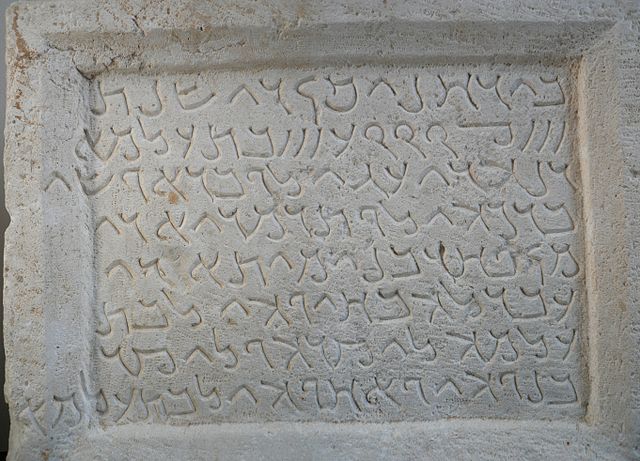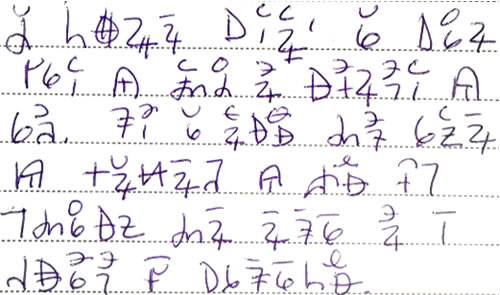Podcast: Play in new window | Download
Here’s the latest news from the world of Omniglot (for the past 3 weeks).
New writing system: Elymaic, a version of the Aramaic script that was used in Elymais, a state that existed in what is now southwestern Iran.

New writing system: Palmyrene, a version of the Aramaic script that was used in Palmyra and other parts of Syria.

New constructed script: Astanari, an alternative way to write Australian English created by Josh Holliday.

New constructed script: Inhglærantow, a different way to write British English invented by Robbie J N.

New constructed script: Arkaedian, an alternative way to write English invented by Mark Lyman.

There are new language pages about:
- Ahamb (naujin sdrato), a Southern Oceanic language spoken on Akhamb and Malekula islands in Vanuatu.
- Neve‘ei (Nabusian teget) a Southern Oceanic language spoken mainly on the west coast of Malekula Island in Vanuatu.
- Batuley (Gwatle lir), an Aru language spoken in the Aru Islands in Indonesia.
- Bunak (Bunaq), a West Bomerai language spoken in East Timor and Indonesia.
- Ambai, a Malayo-Polynesian language spoken in Papua Province of Indonesia.
There are new numbers pages in: Ahamb, Neve‘ei, Daakaka, Batuley, Fiji Hindi and Bunak
On the Omniglot blog there’s a new post about my trip to the Isle of Skye and my Holidays, and the usual Language Quiz. See if you can guess what language this is:
Here’s a clue: this language is spoken in northern France, but isn’t French.
The mystery language in last week’s language quiz was Carijona (Tsahá), a Cariban language spoken in southeastern Colombia.
There’s a new Adventure in Etymology about the word Ship, and related things.
On the Celtiadur blog we have new posts about Fatty Lard, Leaves, Roots and related things in Celtic languages.
There are no new Celtic Pathways podcasts – I didn’t have time to make them while I was away, and have decided to make one every other week. So this week we have a new Adventure in Etymology, and next week I’ll make a Celtic Pathways podcast, and videos to go with it.
In other news, I wrote a new song in Scottish Gaelic this week inspired by my Scottish Gaelic lessons on Duolingo, and my trip to Scotland, during which I learnt lots of Scottish Gaelic songs, and had a wonderful time. It goes something like this:
Here are the words and a translation:
Thoir An Aire (Watch Out)
Seist (Chorus)
Thoir an aire, thoir an aire (Watch out, watch out)
Thoir an aire, tha Iain a’ tighinn (Watch out, Iain is coming)
Thoir an aire, thoir an aire (Watch out, watch out)
Tha Iain rùisgte is tha e a’ tighinn (Iain is naked and he’s coming)
Ghoid Màiri a drathais (Mairi stole his underpants)
Ghoid Màiri a briogais (Mairi stole his trousers)
Ghoid Màiri a geansaidh gorm is geal (Mairi stole his blue and white jersey)
Ghoid Màiri a lèine (Mairi stole his shirt)
Ghoid Màiri a brògan (Mairi stole his shoes)
Ghoid Màiri aodach Iain gu lèir (Mairi stole all his clothes)
Ruith air falbh, ruith air falbh (Run away, run away)
Ruith air falbh tha Iain a’ tighinn (Run away, Iain is coming)
Ruith air falbh, ruith air falbh (Run away, run away)
Tha guga aige is tha e a’ tighinn (He has salted gannet and he’s coming)
Càit bheil Calum? (Where is Calum?)
Càit a bheil Coinneach? (Where is Kenneth?)
Càit a bheil Ceiteag? (Where is Katie?)
Am faca tu iad? (Have you seen them?)
Càit a bheil Mairead? (Where is Margaret?)
Càit a bheil Mòrag? (Where is Morag?)
Ruith iad air falbh (They ran away)
oir tha Iain a’ tighinn (because Iain is coming)
For more Omniglot News see:
https://www.omniglot.com/news/
https://twitter.com/Omniglossia
https://www.facebook.com/groups/omniglot/
https://www.facebook.com/Omniglot-100430558332117
You can also listen to this podcast on: Apple Podcasts, Amazon Music, Stitcher, TuneIn, Podchaser, PlayerFM or podtail.
If you would like to support this podcast, you can make a donation via PayPal or Patreon, or contribute to Omniglot in other ways.
